JUMP TO SECTION
AI-Led Interviews | Hiring Best Practices
Automated Candidate Screening: How AI Transforms Hiring Efficiency and Accuracy
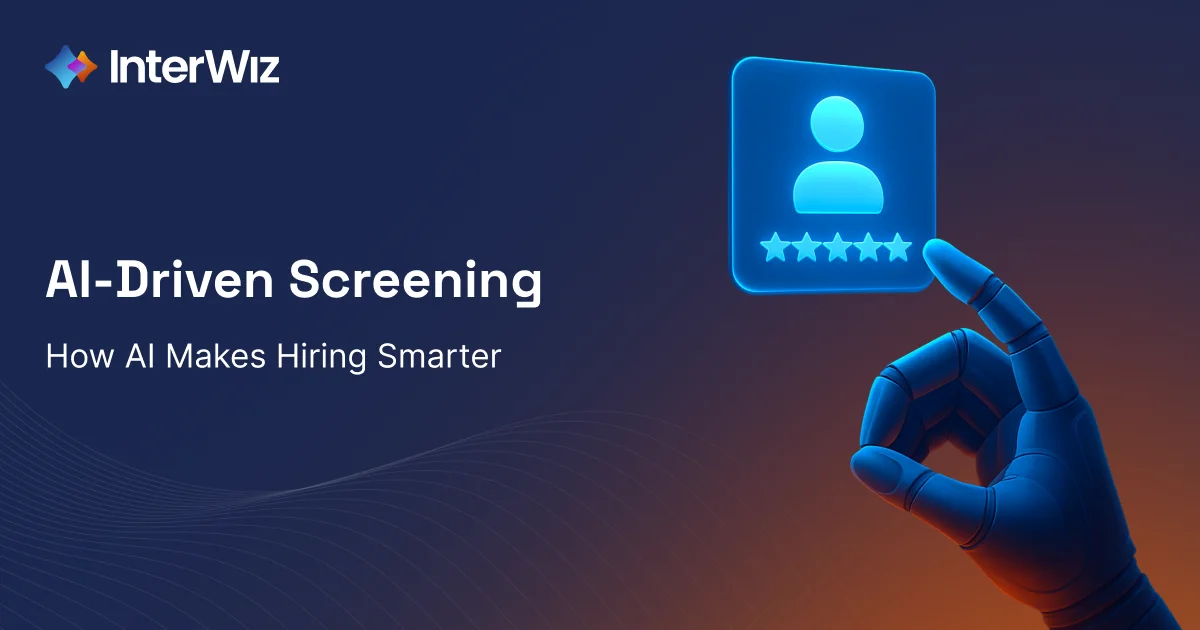
Recruiters today are drowning in applications. A single corporate job posting can attract over 250 resumes on average (Glassdoor), and hiring managers often spend more than 20 hours per role on early screening. The result? Costly delays, missed opportunities, and top candidates lost to faster-moving competitors.
Automated candidate screening solves this bottleneck. By using AI and automation to parse resumes, assess skills, and rank applicants, it streamlines one of the most time-consuming stages of recruitment. What once took weeks can now be completed in hours, without compromising fairness or quality.
In this guide, we’ll explore what automated candidate screening is, why it matters now, how it works, and the benefits it brings to both recruiters and candidates. We’ll also review the best tools available in 2025 and outline the key features to look for when choosing the right solution.
What Is Automated Candidate Screening?
Automated candidate screening is the use of AI and machine learning to evaluate applicants at scale, replacing repetitive manual reviews with intelligent automation. Instead of recruiters spending hours scanning resumes, the system parses candidate data, matches it against job requirements, and delivers a ranked shortlist.
At its core, the technology extracts skills, experience, and qualifications from resumes, online profiles, or assessments, then applies algorithms to identify the strongest fits. Some platforms go beyond keyword matching, incorporating natural language processing (NLP) and predictive analytics to evaluate context and patterns that humans often miss.
Why Automated Screening Matters Today
Recruiters spend up to 23 hours reviewing resumes for a single hire (SHRM), yet more than 60% of candidates drop out before interviews even get scheduled. Manual screening isn’t just slow; it’s a key reason companies lose top talent.
This is where automating the candidate screening process makes a measurable impact. By cutting down hours spent on reviewing resumes and checking skills, automation speeds up hiring and improves accuracy by using clear, consistent algorithms. In high-volume recruiting, automated tools can handle thousands of applications in minutes, something no team of recruiters could achieve manually.
The result is twofold: candidates experience faster responses and fairer evaluations, while recruiters focus on strategic decisions instead of repetitive tasks.
How Automated Candidate Screening Works
Automated candidate screening relies on AI and automation to replicate the early decision-making steps recruiters normally handle. Instead of reviewing resumes one by one, the system extracts, evaluates, and ranks candidates through structured stages.
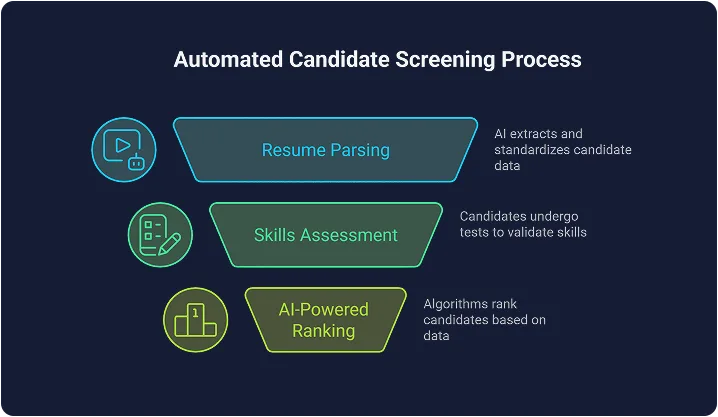
1. Resume Parsing and Data Extraction
The first step is resume parsing, where AI reads applications and converts unstructured data into standardized profiles. Education, work history, skills, and certifications are identified and compared with job requirements. This allows recruiters to see structured insights rather than sifting through raw documents.
2. Skills and Assessment Matching
Beyond resumes, advanced platforms run assessments to validate candidate capabilities. These can include coding challenges, analytical tests, or language evaluations. Most tools, however, fall short in measuring soft skills and cultural fit, which are often decisive in final hiring. InterWiz addresses this gap by combining automated screening with AI-led interviews that evaluate communication, problem-solving, and personality traits, ensuring a more holistic candidate picture.
3. AI-Powered Shortlisting and Ranking
Once data is captured and assessments completed, algorithms generate a ranked list of candidates. This AI-powered shortlisting considers skills, experience, and assessment results, ensuring the strongest fits rise to the top. Recruiters can then focus interviews on the most promising applicants rather than wasting time on mismatches.
Benefits of Automated Candidate Screening
Automated candidate screening isn’t just about speed; it reshapes hiring outcomes across efficiency, cost, and quality.
Faster Time-to-Hire
Manual resume review and early screening can take weeks. By contrast, automation reduces time-to-hire by 30–40% (Aptitude Research), particularly in high-volume candidate screening. Faster screening not only prevents candidate drop-off but also helps companies secure talent before competitors.
Reduced Hiring Costs
Every day a role remains open adds cost, from lost productivity to extended recruiter hours. Automated screening minimizes this expense by reducing manual workload and enabling smaller recruiting teams to manage more candidates. Over time, this translates into a lower cost-per-hire and improved ROI on recruitment efforts.
Improved Quality of Hire
AI-driven screening evaluates candidates against consistent criteria, reducing bias and improving fairness. Recruiters gain reliable shortlists backed by structured data instead of subjective guesswork. InterWiz, for example, enhances this by combining automation with AI-led interviews, giving hiring teams a full view of technical skills, communication ability, and cultural fit.
Automated Screening vs. Manual Screening
Recruiters often ask whether automation can really match, or even outperform, traditional methods. The reality is that both have strengths, but automation consistently delivers greater speed, scalability, and fairness.
Factor | Manual Screening | Automated Candidate Screening |
Speed | Recruiters may spend 20+ hours per role reviewing resumes. | AI parses thousands of applications in minutes. |
Accuracy | Prone to human oversight and inconsistency. | Consistent evaluation based on skills, experience, and assessments. |
Bias | Vulnerable to unconscious bias during resume reviews and interviews. | Standardized criteria reduce bias, with AI-driven fairness checks. |
Scalability | Difficult to manage when applications surge. | Handles high-volume candidate screening effortlessly. |
Candidate Experience | Slower responses often frustrate applicants. | Faster feedback and streamlined evaluation improve candidate experience. |
Cost | Higher recruiter workload and longer cycles increase cost-per-hire. | Lower hiring costs through efficiency and automation. |
The takeaway: Manual screening may still have value for final judgment and niche roles, but tools to automate candidate screening are now essential for competitive hiring. InterWiz strengthens this balance by combining automation with AI interviews, ensuring speed and scale without sacrificing soft-skill evaluation or candidate engagement.
Also read: AI Interview Tools: How They Work, Top Picks, and How to Choose
Key Features to Look for in Automated Screening Tools
Not all automated candidate screening solutions are created equal. Choosing the right one means looking beyond resume parsing and ensuring the tool fits both your hiring volume and your team’s decision-making needs.
1. Multi-Skill Assessment Support
The best platforms don’t stop at resumes; they support coding challenges, analytical tests, language proficiency, and soft skill evaluations. InterWiz extends this further with AI-driven interviews that assess communication, cultural fit, and personality traits often missed by other tools.
2. Customizable Templates and Flexibility
Recruiters need the ability to adapt assessments and screening flows to different roles. Look for tools that allow you to customize templates and weight criteria, rather than forcing a one-size-fits-all process.
3. Integration with HR Tech Stack
A screening tool should connect seamlessly with your applicant tracking system (ATS), HRIS, or scheduling software. This avoids manual data transfer and ensures screening insights flow directly into existing workflows.
4. Analytics and Reporting
Hiring decisions are stronger when supported by data. Platforms that generate detailed candidate rankings, transcripts, and performance reports give recruiters the evidence they need to justify shortlists. InterWiz, for instance, delivers structured reports at the end of each interview so recruiters can compare candidates side by side with confidence.
Best Automated Candidate Screening Software (2025)
Several platforms now offer candidate screening automation, but a few stand out for their unique strengths in AI-driven hiring.
InterWiz
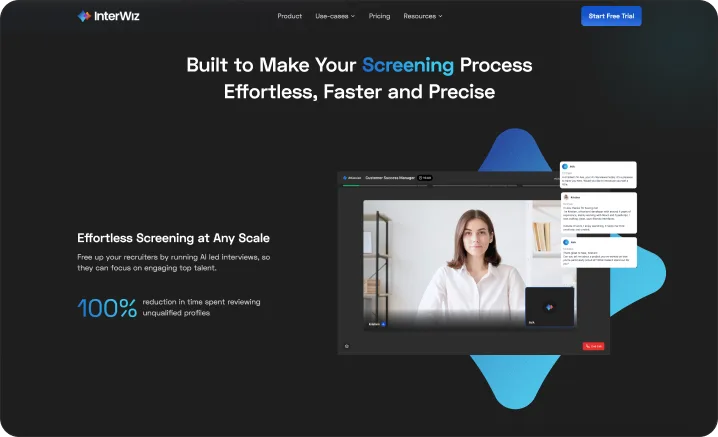
An AI-led interviewer that combines screening with structured interviews. InterWiz evaluates technical, analytical, and soft skills in one platform. Recruiters receive ranked shortlists, interview transcripts, and detailed reports, making it one of the few solutions that blends automated candidate screening AI with in-depth evaluation.
HireVue
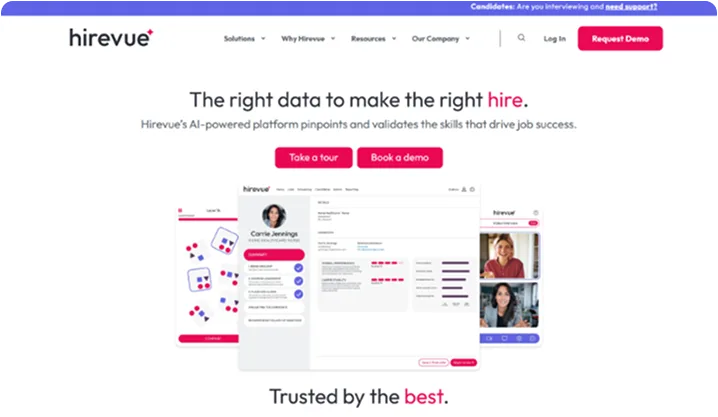
A pioneer in AI-powered interviews, HireVue is widely used for automating high-volume candidate screening. Its strength lies in video-based assessments, supported by AI analysis of verbal and nonverbal cues. Companies use it to filter large applicant pools quickly, especially in early screening stages.
TestGorilla
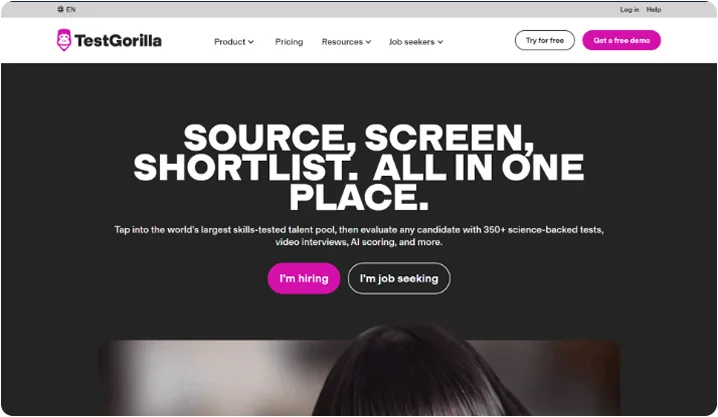
Focused on skills testing, TestGorilla provides over 300 pre-built assessments covering technical, cognitive, and behavioral skills. It’s best for organizations that want structured, role-specific testing at scale, ensuring candidates meet core requirements before interviews.
Vervoe
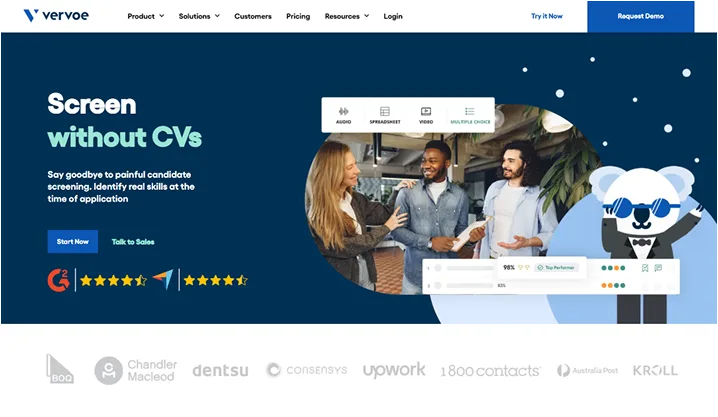
Vervoe emphasizes skills-based hiring by providing customizable AI assessments designed to predict on-the-job performance. Instead of relying solely on resumes, it evaluates how candidates perform in practical, role-related tasks, helping employers identify real capability over credentials.
Harver
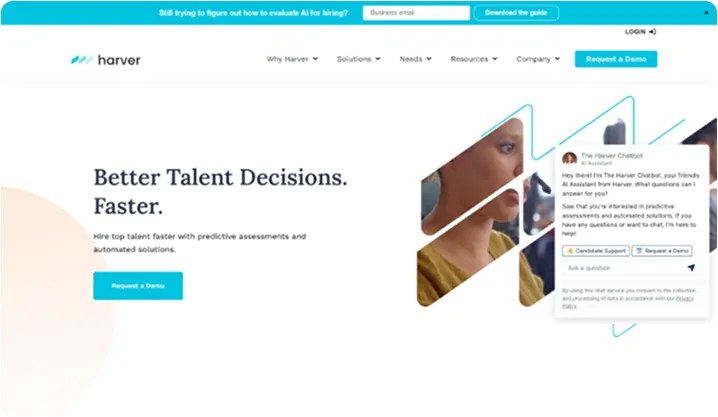
Built for enterprise and high-volume hiring, Harver is widely adopted in retail, hospitality, and customer service industries. It automates large-scale screening through assessments, situational judgment tests, and realistic job previews, reducing attrition by matching candidates with the right roles early.
While most tools emphasize either technical testing or video evaluation, InterWiz differentiates itself by unifying automated screening with AI-led interviews, ensuring recruiters don’t have to choose between efficiency and depth of insight.
When to Use Automated Candidate Screening
Automated screening is most effective in scenarios where speed, scale, and consistency are critical:
High-Volume Hiring: Ideal for industries like retail, customer service, or tech, where thousands of applications arrive for a single role. Automating high-volume candidate screening ensures no strong candidate is overlooked and recruiters aren’t overwhelmed.
Early-Stage Filtering: Quickly separates qualified from unqualified applicants, allowing recruiters to focus only on candidates worth interviewing. This prevents wasted time on mismatched resumes.
Global or Distributed Recruitment: Provides standardized evaluation criteria across regions, reducing location-based bias and ensuring fair comparisons for international candidates.
Time-Sensitive Hiring: In competitive markets, where “top candidates are gone in days,” automation accelerates shortlisting. For example, a tech company hiring 200 engineers can generate ranked lists within hours instead of weeks.
Bottom Line: Smarter, Faster, Fairer Hiring
Automated candidate screening has moved from a nice-to-have to a necessity in modern hiring. By cutting repetitive tasks, it shortens time-to-hire, lowers cost-per-hire, and delivers fairer, more consistent shortlists. Recruiters gain the freedom to focus on interviews and candidate engagement, while candidates experience faster responses and a more transparent process. The real advantage is balance: companies secure talent more quickly without sacrificing quality or fairness. Automated screening doesn’t replace recruiters; it empowers them to make better, faster, and more human-centered hiring decisions.
FAQs on Automated Candidate Screening
Does automated candidate screening replace human recruiters?
No. Automation supports recruiters rather than replacing them. It filters large applicant pools quickly, so recruiters can focus on interviewing, candidate engagement, and final hiring decisions.
How fair is automated candidate screening?
When designed well, automation reduces unconscious bias by applying consistent criteria. However, fairness depends on how the AI is trained and monitored. Companies must regularly audit their tools to ensure fair outcomes, especially in automated high-volume candidate screening.
Can small businesses benefit from candidate screening automation?
Yes. While enterprise companies often lead adoption, small businesses benefit too. Automation allows lean HR teams to process applications faster without needing to expand recruitment staff.
What are the risks of automating the candidate screening process?
Potential risks include over-reliance on keyword matching, poor candidate experience if the process feels impersonal, and compliance issues if the system isn’t transparent. The best automated candidate screening solutions balance efficiency with human oversight.
Which is the best automated job candidate screening software?
The right choice depends on company size, hiring volume, and role types. Options like HireVue, TestGorilla, Pymetrics, and Harver dominate in specific niches, while platforms like InterWiz stand out by combining AI-led interviews with screening automation.

High Quality Screening with AI Interviews
Automated interviews built for speed, scale, and accuracy.
🔥 Full features, no credit card required.